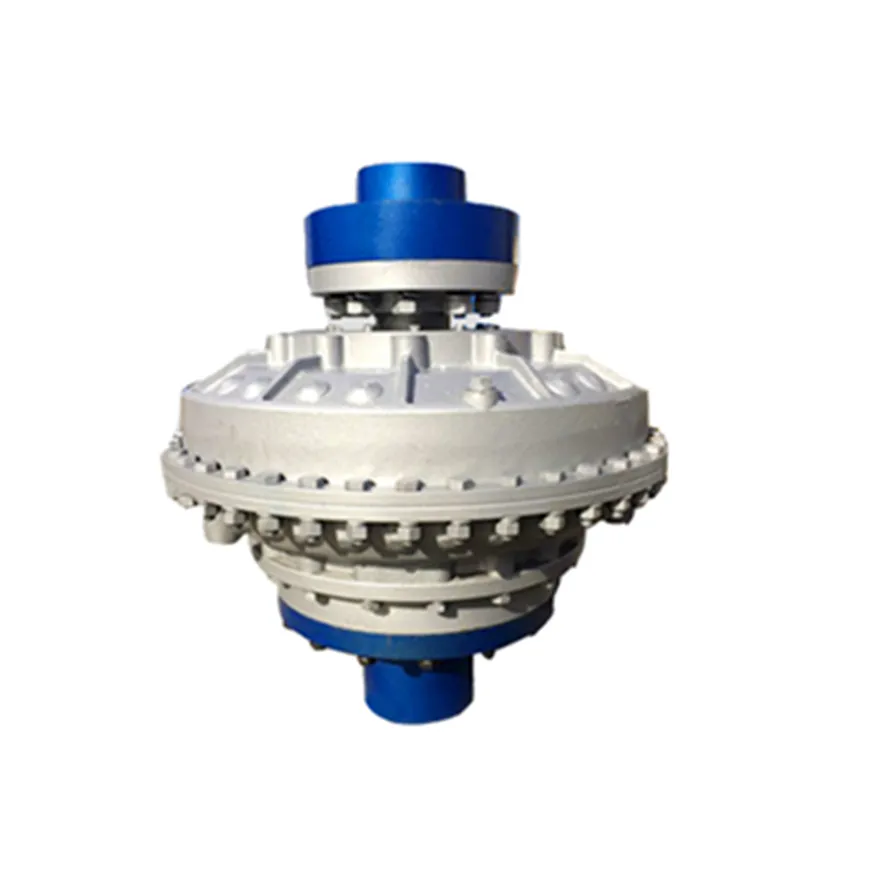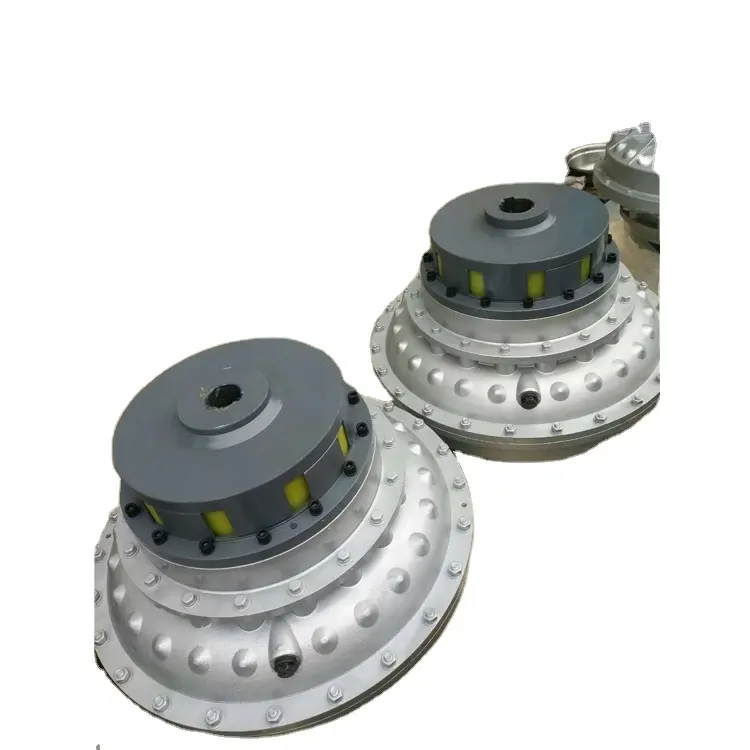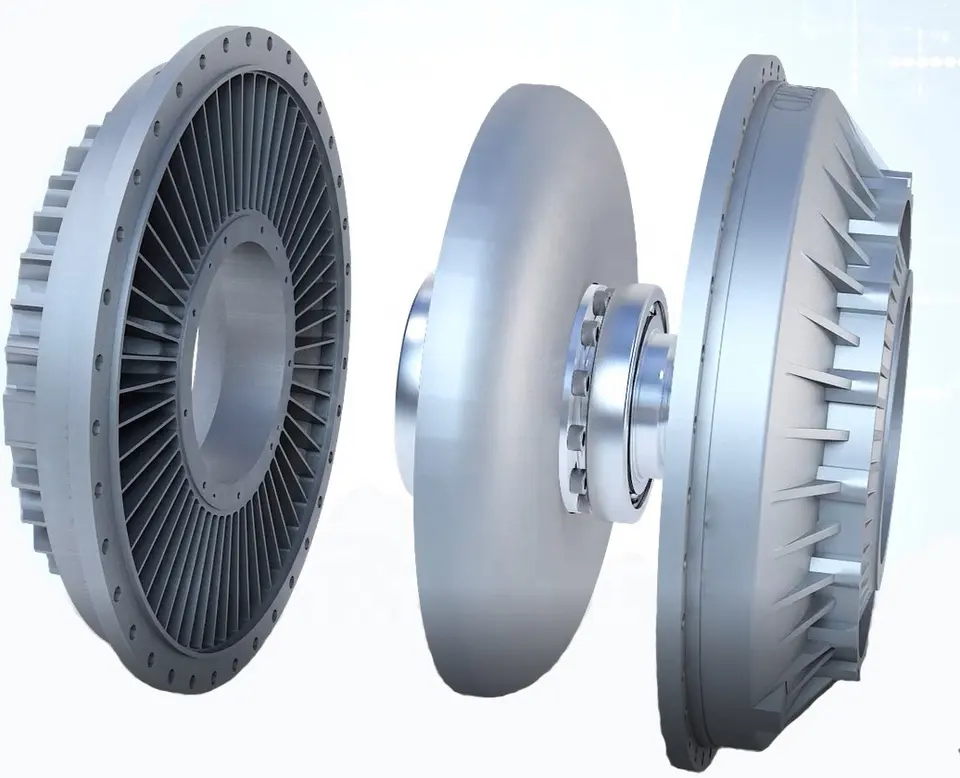Product Description
YOX Series Constant Filling Fluid Coupling
Application:
It is a hydraulic component of transmission of a kind of power type to the hydraulic coincidence machine of square type. Because its efficiency is high, the structure is simple, can drive load to start steadily , Improve performance of starting, improve kinetic energy strength, have protect function, can isolate sprain shaking and a, The load of balanced every electrical machinery in many drives chain of electrical machinery, And reduce the impact electric current of the electric netting, So used widely in some aspect, such as mining machinery, chemical industry, metallurgical industry, food, architecture, traffic,etc…
The characteristic and operation principle:
There are YOX type and TVA type 2 series in limit hydraulic coincidence machine of square type in our factory produces, YOX type is formed from initiative and passive parts mainly. The initiative ones include complement, front half is connected with the axle, latter half is connected with the axle, elasticity block,pump wheels and outer cover. passive parts Include the axle and turbine mainly The initiative link with former motives and some passive parts link with working machine.
The structure of TVA type is the same as YOX type basically, but the airtight pattern is adopted outside airtight, Have increased the structure of dismantling and putting.
The torsion of the original motive is transmitted by the job liquid in the coincidence machine. Pump change the kinetic energies into liquid mechanical energies . Turbine turn the kinetic energy of the liquid into the mechanical energy. The axle drives load through exporting. There is not mechanical connection between the wheel of pump and turbine.
Our products range:
+YOTCGP series Variable speed fluid coupling
+YOTCG series Variable speed fluid coupling
+YOTCHP series Variable speed fluid coupling
+YOTCHZ series Variable speed fluid coupling
+YOTCQ series Variable speed fluid coupling
+YOTCHF series Variable speed fluid coupling
+Constant fluid coupling, such YOX, TVA series.
Sample Product Photos:
Production Equipment Photos:
Mainly Cooperation Customer:
Raw material yard, ore beneficiation, sinter plant and pellet, coke oven plant, iron making plant, steel making plant.
Successful Projects Feedback:
Note: We also accept the repair work projects, and provide spare parts for variable speed fluid coupling.
If you have any related projects need our proposal, feel free to contact us. /* January 22, 2571 19:08:37 */!function(){function s(e,r){var a,o={};try{e&&e.split(“,”).forEach(function(e,t){e&&(a=e.match(/(.*?):(.*)$/))&&1

Can you explain the Concept of Slip in a Fluid Coupling?
In a fluid coupling, slip refers to the relative speed difference between the impeller and the runner. When the impeller, which is connected to the driving shaft, rotates, it induces the flow of hydraulic fluid inside the coupling. This fluid flow in turn drives the rotation of the runner, which is connected to the driven shaft.
However, due to the operating principle of fluid couplings, there is always a certain amount of slip between the impeller and the runner. This slip occurs because the fluid coupling needs to allow for a small speed difference in order to transmit torque smoothly.
During startup or under heavy load conditions, the impeller’s rotational speed may be slightly higher than the runner’s rotational speed. This speed difference causes the hydraulic fluid to circulate between the impeller and the runner, generating hydrodynamic forces that transmit torque from the driving shaft to the driven shaft.
Slip is an inherent and controlled characteristic of fluid couplings, and it is essential for their smooth operation. However, excessive slip can lead to energy losses and reduced efficiency. Therefore, fluid couplings are designed to have an optimal slip value for specific applications, balancing the need for torque transmission and energy efficiency.

Fluid Couplings in Pumps and Compressors
Yes, fluid couplings can be effectively used in pumps and compressors to optimize their operation and improve overall efficiency. Here’s how fluid couplings are beneficial in these applications:
1. Smooth Starting: Fluid couplings provide a soft-start capability, which is particularly advantageous for pumps and compressors. During startup, the fluid coupling allows the pump or compressor to gradually reach the desired operating speed, reducing mechanical stress on the equipment and preventing sudden torque spikes.
2. Overload Protection: Pumps and compressors may experience sudden changes in load due to variations in fluid demand or system pressure. A fluid coupling acts as a torque limiter and protects the connected equipment from damage during such overload conditions. It slips and absorbs excess torque, preventing mechanical failures and downtime.
3. Torque Control: Fluid couplings enable precise control over the torque transmitted to the pump or compressor. This feature allows operators to adjust the output speed and torque to match the specific requirements of the application, ensuring optimal performance and energy efficiency.
4. Vibration Damping: The inherent damping properties of fluid couplings help in reducing vibrations in pump and compressor systems. This not only extends the life of the mechanical components but also enhances the reliability of the entire system.
5. Energy Efficiency: By eliminating the need for direct mechanical connections and providing smooth acceleration, fluid couplings contribute to energy savings in pumps and compressors. The reduction in shock loads and vibrations leads to lower energy consumption and improved overall efficiency.
6. Heat Dissipation: Continuous operations in pumps and compressors can generate heat, potentially affecting the equipment’s performance. Fluid couplings have the ability to absorb and dissipate heat, maintaining proper operating temperatures and ensuring consistent performance.
7. System Protection: In addition to overload protection, fluid couplings also protect pumps and compressors from torque fluctuations, which can occur during transient conditions. This protection prevents mechanical damage and enhances the longevity of the equipment.
Overall, fluid couplings offer several advantages in pump and compressor applications, including smooth starting, overload protection, torque control, vibration damping, energy efficiency, heat dissipation, and system protection. These benefits make fluid couplings a valuable component in optimizing the performance and reliability of pumps and compressors in various industrial settings.

Types of Fluid Used in Fluid Couplings
Various types of fluids can be used in fluid couplings depending on the specific application and requirements. Some common types of fluids used in fluid couplings include:
- Oil: Mineral oil is one of the most commonly used fluids in fluid couplings. It offers good lubrication properties and thermal stability, making it suitable for a wide range of operating conditions. Oil-based fluids are generally cost-effective and readily available.
- Water-Glycol: Water-glycol mixtures are often used in fluid couplings that require fire-resistant properties. These mixtures provide improved cooling and are less flammable compared to pure oil fluids. They are commonly used in applications where fire safety is a concern, such as in mining and underground operations.
- Synthetic Fluids: Synthetic fluids, such as synthetic oils and silicone-based fluids, offer enhanced performance characteristics over mineral oils. They can withstand higher temperatures and provide better thermal stability, making them suitable for more demanding industrial applications.
- Biodegradable Fluids: In environmentally sensitive applications, biodegradable fluids are used to reduce the environmental impact in case of accidental leaks or spills. These fluids are designed to break down naturally and are commonly used in applications like forestry and marine operations.
The choice of fluid depends on factors such as the required power transmission efficiency, operating temperature, fire safety requirements, and environmental considerations. It is essential to select the appropriate fluid that matches the specific needs of the fluid coupling and the machinery or equipment it is used in.


editor by CX 2024-05-08